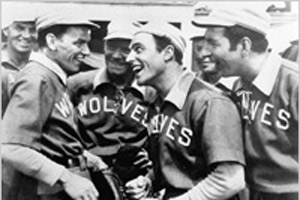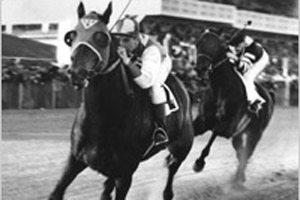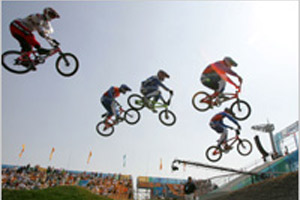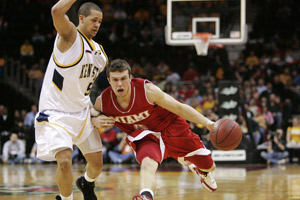Focus on America
Traditional Baseball Song Turns 100

In the spring of 1908, songwriter, singer and vaudeville performer Jack Norworth was riding a subway in New York when he caught sight of a sign: “Baseball Today – Polo Grounds.”
Norworth was hardly a baseball fan -- in fact, he never had been to a real baseball game. But that day, the phrase “take me out to the ball game” somehow stuck in his head, and one of America’s most popular songs was born.
His original lyrics about a girl who wants her “beau” to take her to a baseball game rather than to a show was set to music by a Tin Pan Alley [New York City] composer, Albert Von Tilzer, and was copyrighted 100 years ago, on May 2, 1908.
The song originally was performed by Norworth’s wife, Nora Bayes, and became an immediate hit, featured over the years in numerous vaudeville productions, musicals and movies. In time, it became something even more -- an unofficial “baseball anthem” sung during the “seventh-inning stretch” of a game, when fans stand up and stretch their legs while the teams change positions.
The strange ritual puzzles even some baseball players, known in the sports world for their unusual philosophical dispositions. For example, why would someone who is already at the ball game sing “Take Me Out to the Ball Game”?
"Its really a stupid thing to say and I dont know who made em sing it.… The first person to do it must have been a moron," said Larry Anderson, former pitcher for several major league teams, according to the Baseball Almanac Web site.
Think what you want, but the catchy if simple waltz is forever part of the baseball culture in the United States. (See “Baseball Seen as the Game of Innocence and Growth.”)
It would be hard to prove that it really is, as some claim, the third most popular American tune -- after “The Star-Spangled Banner” and “Happy Birthday to You” -- but “Take Me Out to the Ball Game” can be sung or hummed (in or out of tune) by every American kid and adult whenever the occasion calls.
It has been performed and recorded in pop, rock, jazz, folk, rap and symphonic versions. In the Marx Brothers comedy A Night at the Opera (1935), the song gets mixed up with the Il Trovatore overture. Gene Kelly and Frank Sinatra sing it in a 1949 Busby Berkeley musical titled, naturally, Take Me Out to the Ball Game.
But the tune is most inspiring in enthusiastic amateur renditions, like those by Edison Records special effects man Edward Meeker, who recorded it on a phonograph cylinder in 1908, or Hall of Fame sportscaster Harry Caray, who used to lead the home crowd in singing it during Chicago White Sox and Chicago Cubs games from the 1970s through 1990s.
Not everybody knows that the song has two sets of lyrics: the original 1908 version and the slightly polished 1927 version, both by the Norworth-Von Tilzer team. In each rendition, a young lady is anxious to get to the ballpark to cheer for the home team; in the 1927 version she actually begins to “fret and pout” when her beau suggests the Coney Island amusement park instead. (It is the chorus, the same in both versions, that most baseball fans know by heart.)
Of course, today baseball is more popular with women than ever. According to Major League Baseball (MLB) data, 47 percent of baseball fans are female, and 17 percent of women consider themselves “avid baseball fans.” In the Boston area, the home of the legendary Red Sox (2004 and 2007 World Series champions), 75 percent of women are baseball fans and 39 percent are avid fans.
Obviously, there is no more need to “fret and pout” to enjoy the good cheer and camaraderie at the “old ball game.” And yet, after 100 years, the song “Take Me Out to the Ball Game” remains as popular as ever.
Hear Edward Meeker sing "Take Me Out to the Ball Game" as recorded in 1908 on a phonograph cylinder.
Recently on Focus on America
Sports Films Celebrate American Brand of Perseverance
 Washington -- Like a crucible, sports turns up the heat under its participants to burn off the dross -- not only of their athletic imperfections, but often of their character. For many years, American sports films have focused on the never-say-die spirit that emerges from the competitive fires as pure gold.
Washington -- Like a crucible, sports turns up the heat under its participants to burn off the dross -- not only of their athletic imperfections, but often of their character. For many years, American sports films have focused on the never-say-die spirit that emerges from the competitive fires as pure gold.
BMX Riders Need Endurance, Agility, Explosive Power
 Mike King has been involved with bicycle motocross (BMX), a new Olympic event, for more than 30 years. Recently, King was named by USA Cycling, a family of organizations that promote different bicycle sports, as the BMX program director. This article is reprinted with permission from the Spring 2008 issue of Olympic Coach e-zine, a free service of the United States Olympic Committee for coaches at all levels.
Mike King has been involved with bicycle motocross (BMX), a new Olympic event, for more than 30 years. Recently, King was named by USA Cycling, a family of organizations that promote different bicycle sports, as the BMX program director. This article is reprinted with permission from the Spring 2008 issue of Olympic Coach e-zine, a free service of the United States Olympic Committee for coaches at all levels.
Basketball's March Madness Thrills Fans, Boosts School Morale
 It descends on America every year in late March, together with spring showers and the first blossoms on trees. It is a collective giddiness, excitement, even frenzy that involves gathering in groups, missing classes, making wagers and telling tall tales about the amazing Final Four and the “cutting of the net.”
It descends on America every year in late March, together with spring showers and the first blossoms on trees. It is a collective giddiness, excitement, even frenzy that involves gathering in groups, missing classes, making wagers and telling tall tales about the amazing Final Four and the “cutting of the net.”